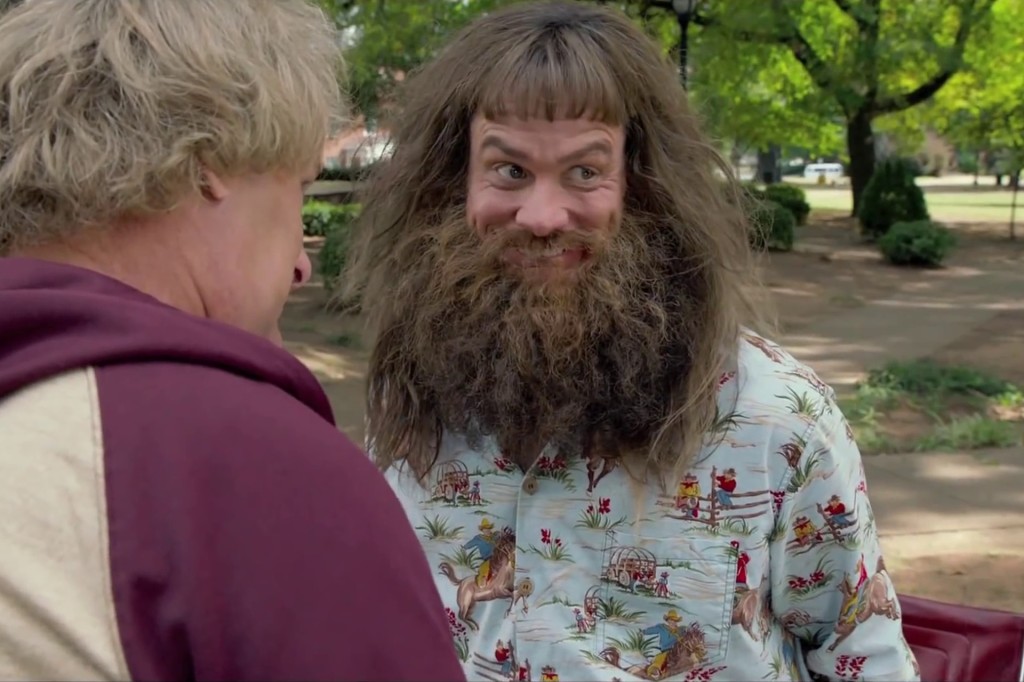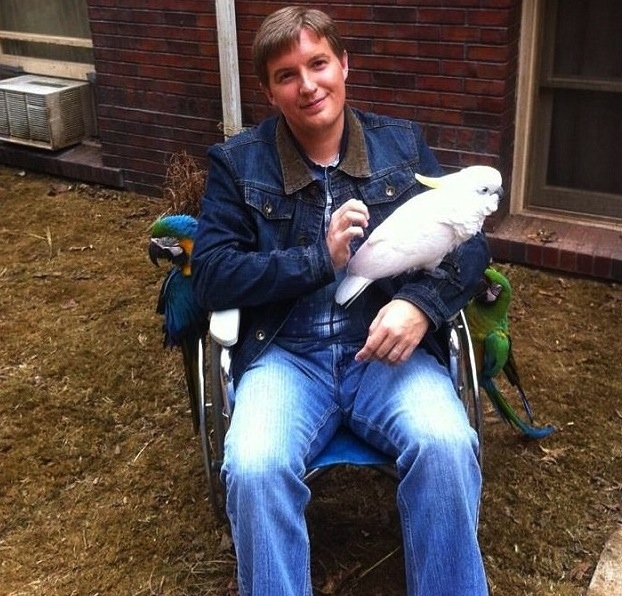Genre: Comedy
Premise: Lloyd and Harry are back! When Harry finds out he has a grown daughter, he and Lloyd hop in their car and drive cross-country to find her.
About: The Farrelly Brothers have been trying to make this movie forever. Even Jeff Daniels has been pining for a sequel. But it wasn’t until Jim Carrey said yes five years ago that the sequel was given the go-ahead. Carrey had come across the first film during a hotel stay and couldn’t get over how much love was put into it. He had to revisit the character. Strangely enough, Warner Brothers, who owned the rights, wasn’t thrilled about the script. They thought it depended too heavily on the past. For example, they didn’t think anyone would know or care about Billy in 4c (“Pretty bird. Pretty bird. Polly wanna cracker?”). Warners was so not sold on the project that they actually dropped it. The Farrellys then took it to Universal, where it really paid off. The film finished number 1 with 38.5 million dollars this weekend at the box office. Peter Farrelly wants to do a third one to complete the trilogy. He wants to call it Dumb and Dumber For.
Writers: Sean Anders, Mike Cerrone, Bobby Farrelly, Peter Farrelly, John Morris, Bennett Yellin
Details: 110 minute running time
Look. Dumb and Dumber To was not as good as Dumb and Dumber. It wasn’t even close. And while that may seem like a contender for “most obvious statement of the year,” there’s a lot to be learned here from the disparity between the two.
You see, over time, I’ve changed my mind about what is the most important aspect of a screenplay. I used to think it was all about the story. Now, I think it’s about the characters. Because if you write compelling characters, the audience will follow them regardless of the story.
Take one of my favorite comedies of all time, Swingers. Swingers has no real story to speak of, and is one of the messier scripts you’re ever going to read. It’s about a guy getting over his girlfriend. No wait, it’s about two guys who go to Vegas. Or wait… now they’re coming back from Vegas. Now it’s about a group of friends bar-hopping. I mean Favreau really deserved a Razzie for the plotting of that story.
But it DIDN’T MATTER because you loved Mikey so much. You wished Trent was your best friend. You loved all those guys. The genius of that movie was that the characters were so strong, you didn’t care what they were actually doing.
Dumb and Dumber was similar. It, too, had a weird story structure. The road trip, which you figure is going to last the entire second act, actually ends around the midpoint, and the last half of the movie takes place in Aspen. But again, you didn’t care. Lloyd and Harry were hilarious so you hopped onto whatever dog and pony show they were offering and enjoyed the ride.
But see here’s where the character theory becomes flawed. Throughout history, we have seen sequel after sequel with our favorite characters, and those sequels have sucked. I mean Ripley (Aliens) is one of the coolest most badass characters ever. But I fucking hated Alien 3. And I hated that character in it.
I didn’t “hate” Dumb and Dumber To. But the magic was gone. Throughout its clunky opening, everything about Lloyd and Harry felt off. Their interactions weren’t as crisp. Their jokes weren’t as funny (“What’s your cat’s name?” “Butthole.” “Why did you name him that?” Harry shows Lloyd the cat’s butthole?). It was like, wait a minute. These characters have already been established as great characters who we love. So why am I not loving this?
This is where you really begin to appreciate the art of screenwriting. Because the reality is, there are no solos in a screenplay. There are a bunch of instruments and they all have to work together for the symphony to work. As important as character is, it cannot work unless you’re placing those characters into interesting situations that the audience cares about. And that was, partly at least, why Dumb and Dumber To failed. You didn’t care as much for the situations the characters were in.
For those who haven’t seen the movie, it’s been 20 years since we last saw Harry and Lloyd. It turns out poor Harry’s kidneys are failing and he needs a transplant. Luckily, Harry finds out that he fathered a daughter 20 years ago. Which means if he finds his daughter, maybe she’ll donate her kidney and Harry will live!
Our two morons learn that Harry’s daughter will be at a “TED” conference across the country, so naturally, they’re going to fit right in. (spoilers) Once there, Lloyd falls in love with Harry’s gorgeous daughter, that is until he realizes Harry’s daughter is actually HIS daughter! Which means who’s going to donate a kidney to Harry? Hmm, somehow I suspect it will all work out.
We’ve established that great characters work up and until the story no longer puts them in situations we care about. So how did that happen in Dumb and Dumber To?
Well, Dumb and Dumber To actually made one of the most obvious mistakes one can make in writing a comedy. It overcomplicated its plot. I will say this until I die. Comedy plots need to be SIMPLE! If you’re stopping every other scene to include exposition, that means you’re not making people laugh. Oh sure, there are ways to be funny when conveying exposition, but it’s never as funny as when you have those unimpeded scenes where all you have to worry about is being hilarious.
Remember when Harry and Lloyd encounter Sea Bass and his crew in the diner in the first film? That’s what I’m talking about. We already have the plot stuff worked out up to that point, so we can just have fun with the scene.
And the plotting really is night and day between these two films. In the first film: Mary Swanson “forgot” her suitcase and Harry and Lloyd needed to return it to her. That was the plot! Here, Harry is dying, which we have to establish. We have to establish that he has a daughter he never knew about. He has to track down the daughter’s mom, then find out where the daughter is. Then and only then can they go on their way.
Each film has a criminal subplot, but the sequel’s subplot requires way more setup. Why? Because the sequel’s subplot has nothing to do with the inciting incident. Which means you have to set up the inciting incident, then use even MORE exposition to set up the criminal subplot itself. Remember in Dumb and Dumber, Lloyd takes the suitcase that was supposed to be the payment to the criminals. So they chase him. See how the inciting incident and the subplot are connected? In the sequel, the inciting incident is Harry’s kidney. The criminal subplot, however, has something to do with a trophy wife trying to kill her husband, Harry’s daughter’s father. Which means, you guessed, EVEN MORE EXPLAINING.
Here’s why all this matters. In storytelling, the best stories just “are.” They don’t FEEL like stories because you’re so wrapped up in them. Call Dumb and Dumber a silly comedy, but it was brilliant in that it didn’t require much plot to set up, which allowed its characters to simply “be.”
Here in Dumb and Dumber To, there’s so much explaining that has to be done in the first act, we become impatient. We become AWARE that we’re watching a movie. We’re wondering why Harry and Lloyd are acting so strange. Why aren’t they just being their dumb fun selves? They’re not being their dumb fun selves because they’ve got a truckload of exposition to feed the audience before the story can begin.
And a clunky first act can really ruin a film, since it puts the audience in a sour mood. Ever try to tell a story to someone who’s in a bad mood? Look, the first act is always tricky because you have to set up a lot of stuff. And in period pieces or sci-fi films, there aren’t a whole lot of ways around that. But in comedy, there usually is. Comedies should feel as effortless as possible, and that’s only going to be the case if you keep the plotting simple so you don’t have to set up half-a-dozen major plot points.
Because the truth is, once Dumb and Dumber To hit its stride and wasn’t bogged down in exposition, flashes of the old Harry and Lloyd returned. The characters seemed much more at ease. They could just “be.” And while it wasn’t like watching the original film, it was close enough that you were having fun again.
I wish I were here bringing you better news. But you’ll probably want to wait until Itunes for this one.
[ ] wut thuh he’ll dud I jest wach?
[x] wuznt 4 me
[ ] werth thuh prys off addmishon
[ ] umpressive
[ ] jeeniyus
What I learned: Try to limit the exposition as much as possible in the first act of your comedy. If you find that no matter what you try, you still have too much, it may be because your plot is too complicated in the first place. Change or dial back the plot so that your first act, and by association the rest of your story, can breathe and just “be.”



